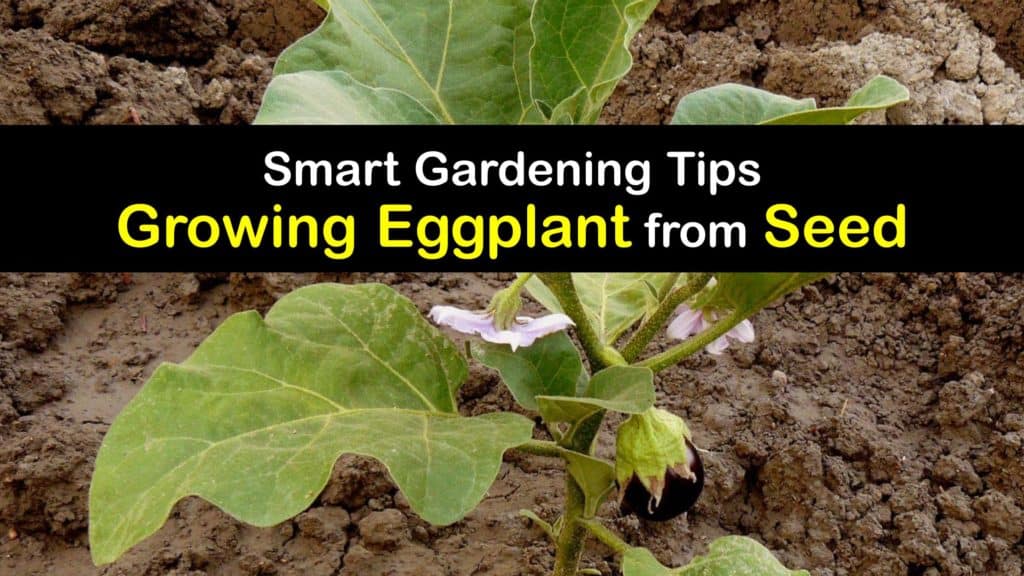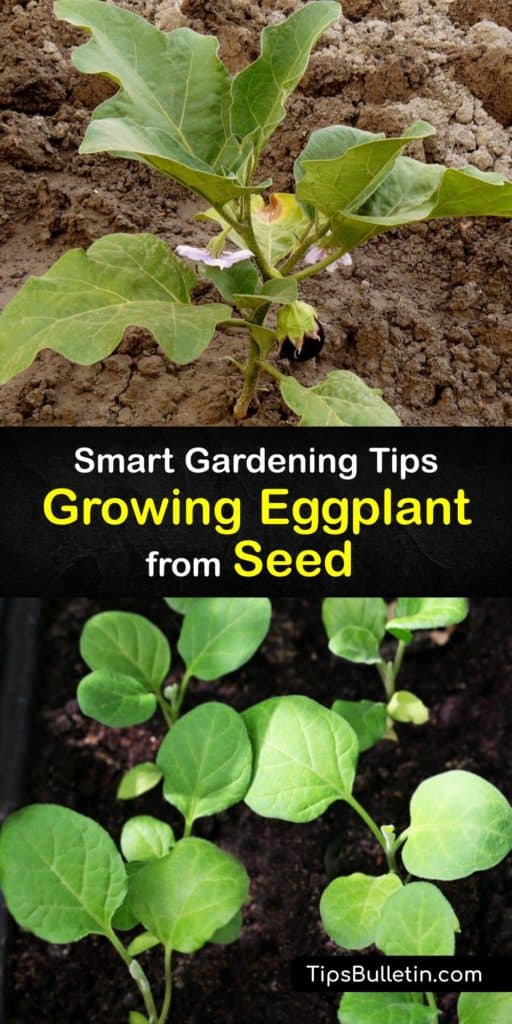Eggplant (Solanum melongena) may seem like an exotic vegetable to grow in the garden, especially if you’re a beginning gardener. However, it’s just as simple to plant and grow as the tomato or pepper plant. Find out how to grow eggplant from seed and give your plant care as it grows.
If you’ve ever needed eggplant for a dish and discovered that your local grocery store doesn’t have any, you understand the importance of growing your own food at home. Growing eggplant ensures that you have fresh and organic eggplant for cooking in your favorite recipes, and you don’t need a lot of space for it to flourish.
Unlike other veggie plants that spread and climb, eggplant plants grow tall and angular, and they are perfect for both the garden bed and containers. However, it’s essential to start eggplant seeds indoors since you have to wait for 100 to 120 days before harvesting eggplant at the end of the growing season.

Planting and Growing Eggplant from Seed
Planting eggplant in the garden or container is both rewarding and easy, and growing eggplant from seeds is an inexpensive way to produce food. The key to healthy growth is to plant eggplant in warm soil and provide it with the right amount of water, food, and sunshine.
Learn how to plant eggplant seeds indoors before the last frost and transplant eggplant seedlings outside when the soil temperature is a minimum of 65°F. Find out what these plants need to thrive and how to harvest eggplant and store them at the end of the season.
What to Know about Growing Eggplant from Seeds
While seed sowing is pretty straightforward, it’s always good to understand your plant’s requirements before starting the growing process. Here are some helpful tips before growing eggplant from seeds.
There are many Chinese and Japanese eggplant types – some good eggplant choices for home-growing are Rosa Bianca, Hansel, Gretel, and Little Fingers. They grow ideally in well-draining soil with a pH between 5.5 and 7.2. Till the garden, remove all weeds, and add a three to four-inch layer of organic matter or compost.

Avoid growing eggplant in areas where tomato and other nightshade family plants grew in previous years to prevent diseases. Choose a garden spot where the plants receive at least six hours of direct sunlight daily and prepare for transplanting outdoors when the temperature is around 70°F.
How to Plant Eggplant Seeds Indoors
Eggplant is a warm-season crop, and it doesn’t tolerate freezing temperatures. It’s crucial to start them inside your home if you live in a cold region. Discover when to plant eggplant seeds indoors and how to plant eggplant seeds to encourage germination.
For these edible plants you can grow indoors, start the eggplant seeds inside eight to nine weeks before your area’s last frost date. Fill a tray with seed starting potting mix, sow the organic seeds a quarter-inch deep in the soil, and spray them lightly with water.
After planting eggplant seeds, set the tray in an area where the temperature is 80 to 90°F and keep the soil moist to encourage germination. Consider covering the tray with a dome to hold in heat and humidity. The eggplant seeds germinate in about seven days.
How to Grow Eggplant from Seed in the Garden
After planting eggplant from seeds inside, and the seedlings emerge, it’s time to move them outside. Learn how to transplant young plants in the garden and direct sow seeds if you live in a mild region. For zones 7 and up, the seeds should be planted in spring outdoors after the last frost.
Six to eight weeks after your seeds germinate, they are ready for transplanting in the garden. Harden them off by taking them outdoors for a couple of hours each day for a week. Transplant the young plants 18 to 24-inches apart in the garden or raised bed, with rows 30 to 36 inches apart.
Water them right after planting and spread black plastic mulch or organic mulch over the bed to retain soil moisture and warmth and prevent weed growth.
It’s best to start eggplant seeds indoors. However, if you reside in a warm region, it’s safe to direct-sow eggplant seeds when the soil temperature is consistently above 70°. Sow seeds a quarter-inch deep and 18 to 24-inches apart, and do not let the soil dry out as they germinate.
Caring for Eggplants as They Grow
Mother Nature cares for her plants to the best of her ability. However, there are times when we must step in and offer support. Care for eggplant plants through the season and watch for problems as they grow.
If you plan on staking your plants, insert the stake at the time of planting to avoid disturbing the roots. Learn what vegetables can be planted together with eggplant to take advantage of nutrients and insect-repelling abilities.
Water your plants consistently without waterlogging them to prevent abnormally-shaped fruit. Consider using a drip irrigation system to discourage splashing the leaves.
Once the eggplant plant grows very small fruits, feed it a 5-10-10 fertilizer, followed by another application a few weeks later. If you prefer, one of the best natural fertilizers for eggplant is manure. Should an unexpected cold front comes in, cover crops with a floating row cover to protect them from damage.
Eggplant is susceptible to the same pests as other nightshade species, including flea beetles and the Colorado potato beetle. Remove the insects from the leaf as soon as you discover them, and apply insecticidal soap.
Verticillium wilt and powdery mildew are common with these plants – planting a disease-resistant eggplant variety and performing crop rotation are ways to prevent these issues.
When to Harvest Eggplant
Once the end of the eggplant growing season draws near, it’s time to prepare for harvest. Find out when and how to pick eggplant fruit and tips for storing your crop to keep it fresh.
How long does eggplant take to grow? Eggplant harvesting usually begins mid to late summer, depending on the type. The fruits taste better when they are young, so check them regularly and harvest them when they just become ripe.
To determine if the eggplants are ready to pick, check the skin to ensure that it’s unwrinkled and glossy, and press your finger to see if they have little give. The way to harvest eggplant is to use a knife or garden clippers to cut the stem an inch above the fruit and store whole eggplants in a cool area of your home away from sunlight for about a week.
Ways to Store Eggplant
Do not keep the eggplant near bananas, melons, tomatoes, and other high ethylene producers to prevent early spoilage. To store cut eggplant, drizzle lemon juice over the pieces and place them in an airtight container in the fridge.
Using Garden Eggplant to Prepare a Hearty Dish
While there are various ways to prepare eggplant, Eggplant Parmesan is one of the most popular. The layers of crispy eggplant, marinara sauce, and cheese are hard to pass up, and this recipe only takes one hour to prepare from start to finish.
Whisk the eggs and almond milk in one bowl and combine the breadcrumbs, Parmesan cheese, red pepper flakes, oregano, thyme, salt, and a few shakes of black pepper in another bowl.
Slice the egg plant into quarter-inch rounds and dip them in the egg mixture, followed by the breadcrumb mixture. Place them on parchment paper-lined baking sheets, drizzle them with olive oil, and bake them in a 400°F oven for 18 minutes.
Spread a half-cup of marinara sauce in a baking dish, layer with half of the eggplant, one cup of marinara, and half of the mozzarella. Repeat the steps to use up the remaining ingredients. Sprinkle with Parmesan cheese, drizzle olive oil over the top and bake for 20 minutes.
Turn the heat to broil and bake for two to four more minutes to brown the cheese. Top with fresh basil and serve the Eggplant Parmesan hot.
Growing your own food from seeds saves money and is a great way to ensure you get organic fruits and vegetables. However, eggplant plants have a long growing season, and it’s vital to start the seeds indoors if you live in a cool climate. The only challenging part about growing eggplant is waiting for harvest.

Now that you know how to grow eggplant from seed for a healthy crop at the end of the season, why not share our eggplant seed planting guide with the gardeners in your life on Pinterest and Facebook?